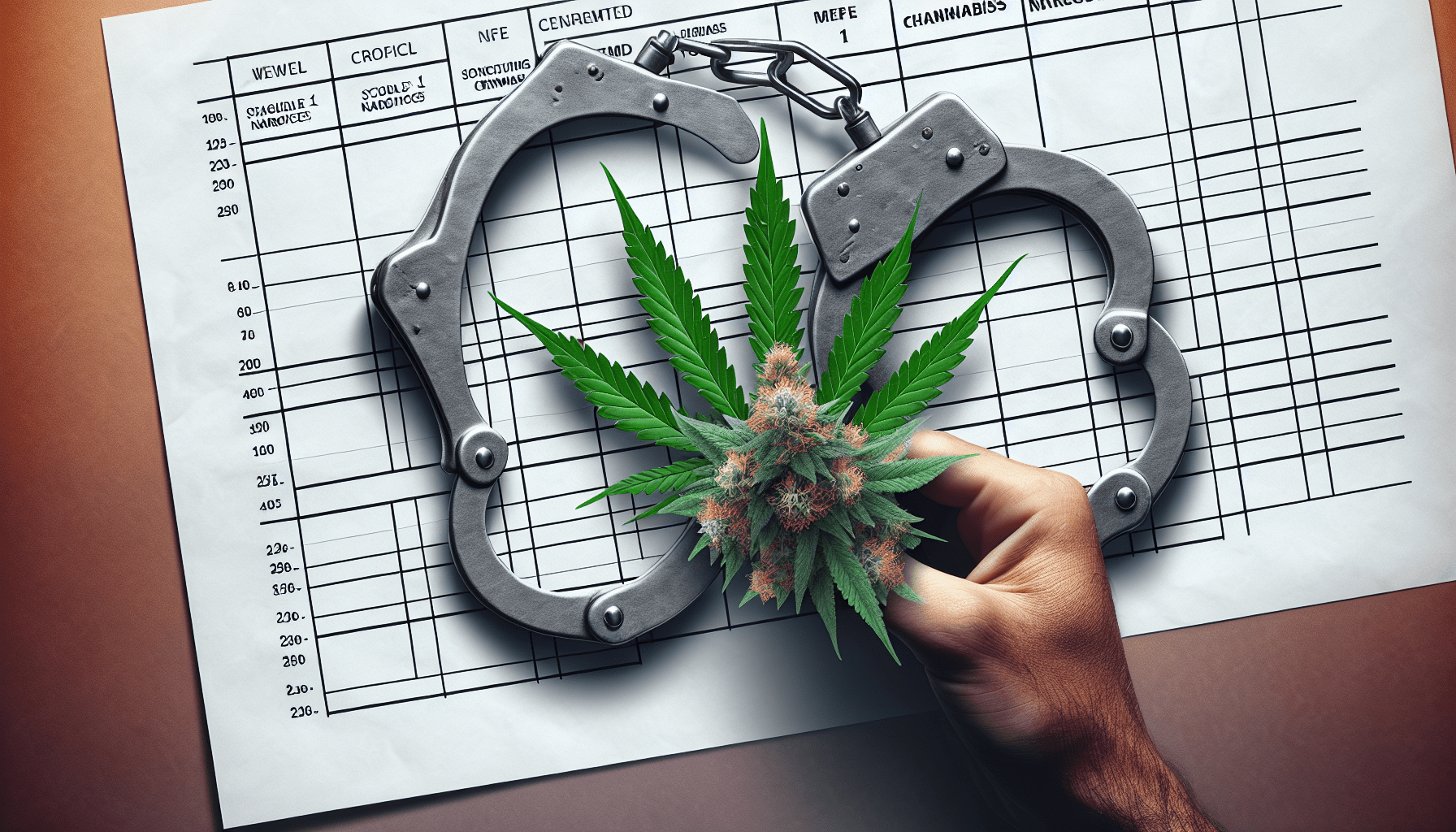So, you may have heard some buzz about cannabis recently, specifically about the idea of removing it from Schedule 1 narcotics. This move would have significant implications for the legal status and potential benefits of cannabis. In this article, we will explore the potential impact of removing cannabis from Schedule 1 narcotics, taking a closer look at how this change could affect both individuals and the broader society. Stay tuned to discover the potential shifts in policies, medical research, and public perception that could come with this bold move.

Medical Benefits
Overview of medicinal uses
Cannabis has gained increasing attention for its potential medicinal uses. The plant contains various cannabinoids, such as THC and CBD, which have been found to have therapeutic effects. Medical cannabis is now being used to treat a wide range of conditions, including chronic pain, epilepsy, and nausea and vomiting associated with chemotherapy. With further research, the potential for cannabis to be used in treating mental health conditions is also being explored.
Treatment for chronic pain
One of the most well-known medical uses of cannabis is its ability to alleviate chronic pain. Many individuals suffering from conditions such as arthritis, multiple sclerosis, or fibromyalgia find relief from cannabis-based treatments. The cannabinoids in cannabis interact with the body’s endocannabinoid system, which plays a role in regulating pain perception. By targeting this system, cannabis can provide pain relief and improve the quality of life for those living with chronic pain.
Management of epilepsy
Research has demonstrated that cannabis can be effective in managing seizures associated with epilepsy. Certain strains of cannabis, particularly those high in CBD, have shown promise in reducing the frequency and severity of seizures. This has provided hope for individuals who have been resistant to conventional anti-seizure medications. Medical cannabis has the potential to significantly improve the quality of life for epilepsy patients.
Alleviation of nausea and vomiting
For individuals undergoing chemotherapy or radiation therapy, cannabis can offer relief from the debilitating side effects of nausea and vomiting. Studies have shown that cannabis can effectively reduce these symptoms, making cancer treatment more tolerable. By improving the overall well-being of patients, medical cannabis can contribute to better treatment outcomes and enhanced comfort during a challenging time.
Potential for treating mental health conditions
While further research is needed, there is growing evidence suggesting that cannabis could be beneficial in treating mental health conditions such as anxiety, depression, and post-traumatic stress disorder. Studies have indicated that specific cannabinoids can modulate the brain’s neurotransmitters, potentially offering relief from symptoms. While caution is necessary in the use of cannabis for mental health, its therapeutic potential is a subject worth exploring.
Economic Implications
Growth of the cannabis industry
The legalization and acceptance of cannabis have led to the rapid growth of the cannabis industry. From cultivation and production to distribution and retail, the industry’s expansion has created numerous business opportunities. This growth is not limited to companies directly involved in the cannabis sector, as ancillary industries such as packaging, marketing, and security have also flourished.
Creation of jobs
As the cannabis industry continues to grow, it is generating new job opportunities in both urban and rural areas. From cultivation and processing to research and sales, the industry requires a diverse range of skills and expertise. The creation of jobs in the cannabis sector can help stimulate economic growth and reduce unemployment rates, benefiting both individuals and local communities.
Tax revenue generation
The legalization and regulation of cannabis also offer significant revenue potential for governments. Taxation of cannabis sales can provide a new revenue stream that can be allocated towards public services, infrastructure development, education, and healthcare. The tax revenue generated from the cannabis industry has the potential to make a substantial impact on regional and national budgets.
Opportunities for research and innovation
The decriminalization of cannabis opens up opportunities for research and innovation in the field of cannabis science. Researchers are now able to conduct studies to better understand the plant’s medical properties, develop new therapies, and explore potential applications across various industries. This increased scientific exploration can lead to groundbreaking discoveries and advancements in medicine, agriculture, and technology.
Impact on related industries
The legalization of cannabis can have a significant impact on related industries, such as pharmaceuticals and agriculture. Pharmaceutical companies may find new avenues for drug development and explore the potential of cannabis-derived compounds for novel therapies. Additionally, cannabis cultivation can provide a lucrative alternative for farmers, allowing them to diversify their crops and contribute to agricultural sustainability.
Criminal Justice System
Reduced incarceration rates
The removal of cannabis from Schedule 1 narcotics can help reduce incarceration rates. Currently, a significant number of individuals are incarcerated for non-violent cannabis-related offenses. By treating cannabis use and possession as a public health issue rather than a criminal offense, resources can be redirected towards more pressing matters, and individuals can be spared the lifelong consequences of a criminal record.
Alleviating burden on law enforcement
Law enforcement agencies spend substantial time and resources enforcing cannabis-related laws. By decriminalizing cannabis, law enforcement can focus on more serious crimes, leading to a more efficient allocation of resources. This shift can improve public safety and foster a better relationship between law enforcement and the communities they serve.
Focus on more pressing criminal matters
The decriminalization of cannabis allows the criminal justice system to concentrate on more pressing criminal matters, such as violent crimes and drug trafficking. By reducing the caseload related to cannabis offenses, courts can allocate their limited resources towards cases that pose a genuine threat to public safety. This targeted approach benefits both the justice system and society as a whole.
Impact on minority communities
The criminalization of cannabis has disproportionately affected minority communities. Removing cannabis from Schedule 1 narcotics aims to address the systemic racial disparities within the criminal justice system. By decriminalizing cannabis, communities that have been disproportionately affected by cannabis-related arrests and convictions can begin to heal and regain trust in the criminal justice system.
Expungement of previous cannabis-related convictions
With the removal of cannabis from Schedule 1 narcotics, the opportunity may arise to expunge previous cannabis-related convictions. Expungement can provide individuals with past convictions a chance to rebuild their lives without the burden of a criminal record. It can also contribute to reducing the long-term social and economic impacts of cannabis prohibition on affected individuals and communities.
Public Health and Safety
Regulation and quality control
The regulation and quality control of cannabis products are crucial for ensuring consumer safety. Legalizing and regulating cannabis allows for the establishment of comprehensive quality control measures, including testing for potency, contaminants, and pesticides. These regulations help protect consumers from potentially harmful products and ensure that individuals have access to safe, reliable cannabis products.
Reduced black market activity
Legalization and regulation of cannabis have the potential to significantly reduce black market activity. When cannabis is available legally and through regulated channels, consumers are more likely to purchase from licensed dispensaries rather than turning to illicit sources. By undercutting the black market, legalization can improve public safety and eliminate criminal activities associated with illegal cannabis trafficking.
Enhancement of consumer safety
Legalization provides the opportunity to educate consumers about responsible cannabis use and ensure they have access to accurate information about dosage, potency, and potential risks. This focus on consumer safety allows for informed decision-making and reduces the likelihood of adverse effects. The availability of legally regulated products also allows individuals to make choices that align with their preferences and needs.
Lower rates of drug-related violence
The illegal drug trade is often associated with violence and organized crime. By legalizing cannabis, a significant portion of the illegal drug market can be undermined, reducing drug-related violence that stems from disputes over territory and control. This reduction in drug-related violence contributes to overall public safety and fosters more peaceful communities.
Impact on driving under the influence
One concern surrounding cannabis legalization is the potential for an increase in driving under the influence (DUI) incidents. Establishing clear regulations and educational campaigns can help address this issue. By educating individuals about the risks of impaired driving and enforcing strict DUI laws, the negative impact of cannabis on road safety can be mitigated, ensuring public health and safety.

Social Implications
Changing societal attitudes
Removing cannabis from Schedule 1 narcotics brings about a shift in societal attitudes towards cannabis use. As more research reveals the potential benefits of cannabis, stigma surrounding its use decreases. This changing perception fosters a more open-minded and informed society, allowing for honest discussions about responsible cannabis use and its potential as a valuable medical tool.
Reduction in stigma
The stigma associated with cannabis use has, for many years, hindered open conversations and research on the plant’s potential benefits. Its removal from Schedule 1 narcotics helps to diminish the negative connotations surrounding cannabis, allowing individuals to explore its uses without fear of judgment or legal consequences. This reduction in stigma can promote a more inclusive and understanding society.
Impact on youth perceptions
It is essential to address the impact of cannabis legalization on youth perceptions and attitudes. Comprehensive education and prevention programs can help inform youth about the potential risks of cannabis use and encourage responsible decision-making. By providing accurate information and promoting open dialogue, youth can make informed choices regarding cannabis use and prioritize their health and well-being.
Community integration and acceptance
As cannabis becomes more widely accepted, it has the potential to foster community integration and acceptance. By creating spaces for responsible cannabis use, such as cannabis lounges or social clubs, individuals can engage in this activity while respecting the preferences and boundaries of non-users. This inclusivity and acceptance of diverse lifestyle choices can contribute to a more harmonious and tolerant society.
Cannabis tourism and local economies
Legalization of cannabis can create opportunities for cannabis tourism, with visitors traveling to regions where cannabis is legally available. This influx of tourists can have a positive impact on local economies, supporting various industries such as hospitality, tourism, and retail. By capitalizing on the appeal of legal cannabis, communities can cultivate economic growth and diversify their revenue streams.
Research and Education
Increased research opportunities
The removal of cannabis from Schedule 1 narcotics allows for increased research opportunities. Scientists can now conduct more rigorous studies to better understand the plant’s potential health benefits, risks, and appropriate use. With greater access to research funding and fewer regulatory barriers, researchers can explore cannabis’s therapeutic potential and develop evidence-based guidelines.
Expanding knowledge on potential health benefits
As research on cannabis expands, so does our knowledge of its potential health benefits. By conducting clinical trials and longitudinal studies, researchers can gain a better understanding of how cannabis interacts with the body and its efficacy for various conditions. This growing body of knowledge can inform healthcare providers in their decision-making and help patients make informed choices about their treatment options.
Educational initiatives
For the public to make responsible decisions regarding cannabis use, education is crucial. Implementing educational initiatives that provide accurate information about the risks and benefits of cannabis can help dispel misinformation and reduce potential harm. Educating individuals about responsible consumption, potential side effects, and harm reduction strategies enables them to make informed choices and prioritize their well-being.
Training for healthcare professionals
With the legalization of cannabis, healthcare professionals need to be adequately trained to navigate the complexities of cannabis as a therapeutic option. Continuing education programs can equip healthcare professionals with the knowledge and skills necessary to provide evidence-based guidance to patients interested in exploring cannabis as a part of their treatment plan. By staying informed, healthcare professionals can offer the best possible care to their patients.
Public awareness campaigns
Public awareness campaigns play a vital role in ensuring accurate information reaches the general population. These campaigns can focus on providing knowledge about responsible cannabis use, debunking myths and misconceptions, and promoting harm reduction strategies. By disseminating reliable information, public awareness campaigns contribute to the overall well-being and safety of individuals and communities.

Regulatory Challenges
Establishing comprehensive regulatory frameworks
The legalization of cannabis requires the establishment of comprehensive regulatory frameworks to ensure public safety and product quality. This includes regulations on cultivation, manufacturing, labeling, packaging, and distribution. Drafting and implementing these frameworks can be a complex process that involves collaboration between lawmakers, experts, and stakeholders to strike the right balance between regulation and accessibility.
Standardization of dosage and potency
Standardizing the dosage and potency of cannabis products is crucial for consumer safety and effective medical use. Without consistent guidelines, individuals may have difficulty determining the appropriate dosage for their needs, potentially leading to adverse effects. Developing standardized methods for measuring and labeling the concentration of cannabinoids in cannabis products is essential to ensure consistent and accurate dosing.
Ensuring product safety
With the increasing availability of cannabis products, ensuring their safety is paramount. Establishing regulations and standards for testing cannabis products for contaminants, pesticides, and other potentially harmful substances is necessary to protect consumers’ health. Rigorous product safety protocols help maintain consumer confidence in the regulated market and protect individuals from the risks associated with consumption of unsafe products.
Protecting public health
While cannabis has potential health benefits, it is not without risks. Effective regulatory frameworks must address public health concerns, such as preventing underage use, discouraging excessive consumption, and minimizing the risk of dependence. Striking the right balance between promoting access to cannabis for medical and recreational use and safeguarding public health requires careful consideration and ongoing evaluation of policies and regulations.
Monitoring advertising and marketing practices
Regulating the advertising and marketing of cannabis products is crucial to prevent misleading or irresponsible practices that may encourage excessive use or appeal to vulnerable populations. Strict guidelines can help ensure that marketing efforts remain responsible and targeted towards informed adults, while minimizing the risk of normalization or glamorization of cannabis use. Monitoring and enforcing these guidelines is necessary to protect public health and prevent the exploitation of consumers.
International Implications
Harmonization of cannabis regulations
The removal of cannabis from Schedule 1 narcotics could pave the way for greater international harmonization of cannabis regulations. Countries can learn from one another’s approaches, share best practices, and collaborate on research efforts to better understand the potential benefits and risks associated with cannabis. This global coordination can lead to more consistent policies and a better exchange of knowledge and expertise.
Global perception and legalization
The removal of cannabis from Schedule 1 narcotics challenges the global perception of the plant. It encourages more countries to reconsider their stance on cannabis legalization and explore ways to regulate its use responsibly. The shifting perception towards cannabis as a potential medical tool can promote international dialogue and foster a more nuanced understanding of the plant’s benefits and risks.
Trade and export opportunities
Cannabis legalization can open up trade and export opportunities for countries with well-regulated cannabis industries. Producers can capitalize on the growing demand for legal cannabis products, exporting them to countries where they are legal or have established medical cannabis programs. This expansion of trade can stimulate economic growth and promote international cooperation among countries interested in the cannabis market.
International drug policy reform
The removal of cannabis from Schedule 1 narcotics may contribute to broader drug policy reform on an international scale. It challenges the existing prohibitionist approach and encourages countries to reevaluate their drug policies, focusing on harm reduction and public health measures rather than strict criminalization. This shift towards a more evidence-based and health-centered approach to drug policy can have far-reaching implications beyond cannabis.
Diplomatic considerations
Cannabis legalization has diplomatic considerations that require careful attention. Countries that have chosen to legalize cannabis must consider the potential impact on international relations, particularly with countries that have stricter drug policies. Communication and cooperation between nations are essential to navigate potential challenges and foster a shared understanding of cannabis regulation to ensure diplomatic relations remain strong.

Long-term Health Effects
Research on potential risks
While the medical benefits of cannabis are being increasingly recognized, it is crucial to thoroughly examine the potential risks associated with its use. Long-term studies are needed to investigate the effects of prolonged cannabis use on physical and mental health. Understanding potential risks, such as respiratory issues, cognitive impairment, and the potential for addiction or dependency, is essential for promoting responsible use and informing public health policies.
Impact on mental health
Cannabis use has been linked to a range of mental health outcomes, including increased risk of developing or exacerbating certain conditions. Research is needed to better understand how cannabis use can impact mental health and identify potential risks, particularly in individuals with pre-existing mental health conditions. This knowledge can inform prevention strategies, treatment guidelines, and support services for individuals seeking help.
Assessing addiction and dependency
While cannabis is not as addictive as many other substances, it is important to acknowledge that some individuals may develop cannabis use disorder or dependency. Research should focus on understanding the risk factors, prevalence, and potential treatment options for individuals struggling with cannabis addiction. By addressing addiction and dependency in a compassionate and evidence-based manner, individuals can receive the support they need to overcome their challenges.
Effects on cognitive development
One area of concern with cannabis use is the potential impact on cognitive development, particularly in adolescents and young adults. Longitudinal studies are necessary to determine how cannabis use during critical periods of brain development may affect cognitive functioning, memory, and academic achievement. Recognizing potential risks and raising awareness can help individuals make informed decisions about cannabis use during this critical stage of life.
Examination of respiratory health
Smoking cannabis has been linked to respiratory issues, similar to those associated with tobacco smoke. Research should focus on understanding the long-term consequences of smoking cannabis on respiratory health, particularly in heavy or chronic users. Exploring alternative methods of consumption, such as vaporizers or edibles, may help mitigate potential respiratory risks associated with cannabis use.
Social Equity
Plans for reinvestment in affected communities
As cannabis legalization progresses, it is essential to develop plans for reinvesting in communities disproportionately affected by cannabis prohibition. This reinvestment can include initiatives such as job training programs, educational resources, access to healthcare services, and economic development projects. By addressing the historical inequities related to cannabis prohibition, communities can heal and thrive in the era of legal cannabis.
Supporting minority-owned cannabis businesses
The cannabis industry should actively support and promote minority-owned businesses to ensure equity and diversity within the sector. By providing resources, mentorship, and access to capital, barriers to entry can be reduced, and individuals from underrepresented communities can participate in this emerging industry. Supporting and amplifying the voices of minority entrepreneurs can help foster economic empowerment and social equity.
Ensuring equitable access to cannabis
Equal access to cannabis is crucial to ensure social equity. Efforts should be made to address barriers that may prevent certain populations from accessing legal cannabis, such as high costs or limited availability in underserved areas. By prioritizing equitable access, communities can reap the benefits of cannabis legalization, promoting fairness and inclusion.
Addressing historical injustices
Cannabis prohibition disproportionately impacted certain communities, particularly communities of color. Recognizing and addressing these historical injustices is an essential step towards achieving social equity. This can involve expunging past cannabis-related convictions, providing legal assistance to those affected, and implementing policies that consider the historical context and aim to rectify the impact of prohibition on marginalized communities.
Creating fair licensing processes
The licensing process for cannabis businesses must be fair and transparent to ensure equitable participation. It is important to eliminate biases and promote diversity within the industry by considering social equity criteria when awarding licenses. Fair licensing processes create opportunities for individuals who may have faced barriers due to the historical impacts of cannabis prohibition, leveling the playing field and promoting social and economic justice.
Overall, the impact of removing cannabis from Schedule 1 narcotics is extensive and far-reaching. It has significant implications for medical treatment, economic growth, the criminal justice system, public health, societal attitudes, research and education, regulatory challenges, international relations, long-term health effects, and social equity. By exploring and addressing these various aspects, society can navigate the complexities of cannabis legalization and maximize its potential benefits while minimizing potential risks.

